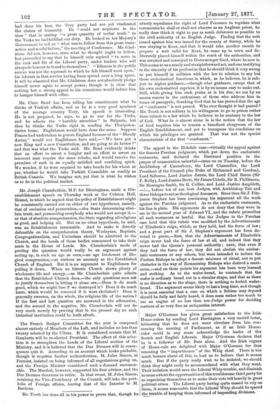The appeal in the Ridsdale case—virtually the appeal against the
famous Purchaa judgment, which put down the eucharistic- vestments, and declared the Eastward position in the prayer of consecration unlawful—came on on Tuesday, before the Archbishop of Canterbury, the Lord Chancellor, the Lord President of the Council (the Duke of Richmond and Gordon), Lord Selborne, Lord Justice James, the Lord Chief Baron (Sir F. Kelly), Lord Justice Brett, Siaames Colvile, Sir R. Phillimore, Sir Montague Smith, Sir R. Collier, and Lord Justice Amphlett, —i.e., before ten of our best Judges, with Archbishop Tait and three bishops to act as theological Assessors. Since then Sir J. Fitz- james Stephen has been continuing his argument all the week against the Purchas judgment. As to the eucharistic vestments,, his line is plain. His opponents do not deny that they were in use in the second year of Edward VI., and the rubric prescribes all such vestments as lawful. But the Judges in the Parchen case held that this rubric was modified by the Advertisements of Elizabeth's reign, which, as they held, had the force of law ; and a great part of Sir J. Stephen's argument has been de- voted to prove,—first, that the Advertisements of Elizabeth's reign never had the force of law at all, and indeed that they never had the Queen's personal authority ; next, that even if they had the force of law, they did not abolish the euchar- istic vestments or any others, but were intended to induce the Puritan Bishops to adopt a decent minimum of ritual, not to put obstacles in the way of Romanising Bishops who desired a maxi- mum,—and on these points his argument has been very learned and striking. As to the wafer-bread, he contends that the wafer is ordinary bread cut in a circular shape, and that as there is no direction as to the shape, there is nothing to forbid wafer- bread. The argument seems likely to last a long time, and though it is most essential that a case on which a Schism may depend should be fully and fairly heard, it does seem rather too much to use an engine of no less than ten-Judge power for deciding matters of so very fine an antiquarian interest.


































 Previous page
Previous page